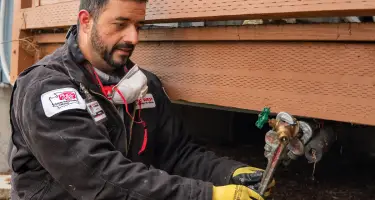
Repiping your home is a large undertaking, so it’s important to know when it’s warranted or when a smaller repair may be more appropriate. Here’s a quick overview of the process and what signs may indicate a full repiping project is needed.
What Is Repiping?
Repiping is the replacement of either a single pipe or a home’s entire plumbing system, including both water supply and drain lines. Usually, a whole-house repipe is worth the investment in the long run because it may address the root cause of the chronic plumbing problems in your home.
A typical whole-house repipe can take anywhere from three to five days, depending on the size of the home, how many levels it has and the chosen pipe material. During a repipe, plumbers will make strategic cuts in the drywall, completely replace the pipes, reinstall the removed drywall and patch it to erase any signs of damage or alteration to your home.
When You Should Repipe Your Home
Your Pipes Are Old or Unsafe
If your pipes are close to or past their useful life, it’s time to consider replacing them completely. Pipe lifespans vary, but generally speaking, pipes 50 years or older need to be inspected. Materials commonly used during the 1970s, such as galvanized steel, may have corroded by now. It’s also crucial to replace lead pipes as soon as possible because of their adverse health effects as well as polybutylene pipes, which tend to leak.
Multiple Leaks
You may be tempted to weld or patch a leak shut or replace only a single section of pipe to save money. While this may work in the short term, remember that the weakened pipe is made of the same material as other pipes in your home, meaning that trouble could be brewing elsewhere in your plumbing system. Repiping now will give you peace of mind and prevent larger leaks down the road.
Low Water Pressure
Unexpected changes in water pressure could potentially be due to corrosion and buildup within the pipes themselves, which narrow the passage that water can move through. You’ll most likely notice lower water pressure in the shower or when washing dishes. The best solution is to replace your plumbing with new pipes that don’t have buildup.
Water Discoloration
Water in older pipes may appear yellow, brown or red in color, especially if you’ve recently turned on the tap after spending time away from home. Discoloration indicates rust or some other sediment buildup in the pipes. However, if you only notice this issue when running hot water, you could have a corroded water heater.
Trying to clean the pipes or treat the water with chemicals will not fix the problem, as the pipes are deteriorating slowly from the inside. In most cases, repiping is your only viable option.
Bad Taste or Smell
Like discoloration, bad tasting or smelly water is off-putting and potentially unsafe. If you do not trust your tap water enough to drink it anymore, it’s best to call a certified plumber to assess the problem. There is a good chance the smell or taste could be due to the breakdown of your pipes.
Extreme Temperature Swings
Does your shower switch from icy cold to unbearably hot on a dime? There is a chance that corroded materials have broken off inside your pipe and jammed the anti-scald device or valve regulating your water temperature. Replacing your pipes should resolve this issue.
Bangs and Thuds
Other than water trickling and the occasional creak, your pipes should not be making any odd noises, especially not ones loud enough to keep you up at night. If your pipes are rattling, clanking, banging or making other obnoxious sounds, that’s a surefire sign of a larger problem. Have your pipes inspected as soon as possible so you don’t end up with a major leak.
Repipe Your Home With South West Plumbing
If your pipes are acting up, it’s time to schedule an appointment with a professional. Here at South West Plumbing, our team of certified plumbers can quickly identify the source of any plumbing problem and recommend the solution that’s best for you.
When you elect to repipe your home, we will take special care to protect your belongings and keep demolition to a minimum. Within a few days, you will see an enormous difference in water quality and perhaps even a dip in your monthly water bill. Contact us to request service today!









